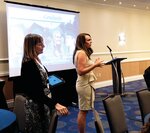



Educators from New Hope-Solebury School District were recently invited to present workshops focused on their most groundbreaking programs at the American Association of School Administrators’ (AASA) Learning 2025 Summit in Washington, D.C.
The workshops highlighted the district’s renovation process to create a state-of-the-art STEAM (science, technology, engineering, arts, and math) education facility and its signature APEX (Active Personal Educational Experience) internship program for seniors.
The AASA Summit gathered representatives from 137 public school districts committed to the Learning 2025 project, an initiative to drive rapid innovation in our public school systems. As a result of New Hope-Solebury’s participation in the project, the district’s educators have connected with colleagues from like-minded, future-focused schools across the nation throughout the past two years.
“We have had the opportunity to exchange ideas and practices with colleagues in our country’s most innovative schools,” said high school Principal Patrick Sasse during his workshop introduction. “It is giving us the chance to see new possibilities and translate them to meet our needs and to share our successes with our colleagues. This has greatly supported some of our recent projects, including renovations to our classroom spaces and our new high school schedule, which will transition to a block format with extended instructional time next year.”
The first presentation focused on the school district’s rapid renovation of an outdated woodshop to create an industry-grade STEAM education facility and its launch of a groundbreaking K-12 STEAM curriculum within the past year. Presenters Amanda Benolken, New Hope-Solebury’s director of education, and Richard Curtis, K-12 STEAM coordinator, shared the details of how they managed the substantial undertaking, highlighting the partners and vendors they vetted to fully realize the vision, the considerations when developing a classroom space to support technology’s rapid advancements, and cost-savings measures they implemented.
“We were given a quote of $30,000 for a design element, metal lettering, in our new space,” Curtis said. “I realized we could spend $40,000 on a CNC machine, enable our students to fabricate the lettering in our new classroom, and have a transformative machine to serve our engineering design courses for years to come. I encourage you to think outside of the box and explore multiple possibilities when investing in a project like this.”
The second presentation highlighted the district’s APEX program, which launched in 2015, and its Career Pathways program, which launched in 2022-2023 school year. APEX Coordinators Lori Soriano and Andrea Korn detailed the logistical considerations to launch a successful offsite, career-minded learning experience and demonstrated the positive impacts of the program. The APEX experience requires seniors to spend the final three weeks of their school year engaged in career-focused exploration. Professionals from neighboring businesses and organizations host the students for 60 hours and offer them job shadowing and hands-on learning experiences.
“As someone who has been teaching exclusively seniors for years, I don’t believe in the term ‘senioritis,’” said Soriano as she explained the impetus for the APEX program. “If we have done our jobs as teachers, the students are prepared and ready for what’s next, and at that point in the school year, they are ready to do something that matters to them.”
New Hope-Solebury’s College and Career Readiness counselor Sarah Reeder, in a newly developed staff role formed two years ago, explained how the district took the success of APEX and built a foundation beneath it.
“The most common reflection we received from our seniors when they completed surveys about APEX was, ‘This was a great experience and helped me make a more informed decision about college majors and possible careers. I wish I was able to do it earlier,’” said Reeder during the workshop.
At the same time, the Pennsylvania Department of Education mandated that districts begin enhancing their career exploration curricula.
“This sparked our efforts to build a four-year, sequential set of experiences for students,” said Reeder. The curriculum begins with a career exploration course for freshmen promoting research with a broad scope and is then followed by a series of tailored opportunities, such as career panels, mock interviews, and resume workshops for sophomores and juniors. “The culmination of this will be APEX, and while that program has already had tremendous success, it will now be even more true to its nature as a capstone to our students’ educational experience,” Reeder added.
Other New Hope-Solebury team members who attended the Summit included Assistant Superintendent Rose Minniti, Gifted Education and Student Equity advisor Sarah O’Hara, Science Curriculum and Career Pathways liaison Stefanie Ryan, and Elementary Educator and Equity coordinator Jacqueline Miller. The group engaged in workshops highlighting the potential impacts of artificial intelligence in the classroom, transforming educational models, and life-ready, future-focused opportunities for students.
The Learning 2025 Summit was hosted by the AASA in partnership with the Successful Practices Network (SPN) from Monday, June 26 through Wednesday, June 28. There were approximately 800 attendees with varying roles within public schools. The objective of Learning 2025 is the future-focused capacity-building of our education system. The Summit showcased a range of successful and innovative practices from across the nation that are reshaping our classrooms and offered workshops to support leadership development, innovation and classroom culture.
Join our readers whose generous donations are making it possible for you to read our news coverage. Help keep local journalism alive and our community strong. Donate today.